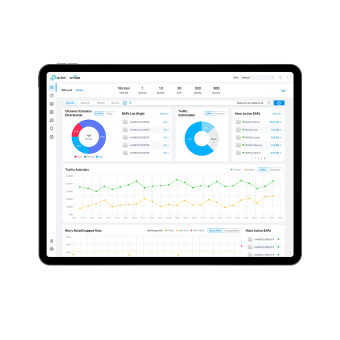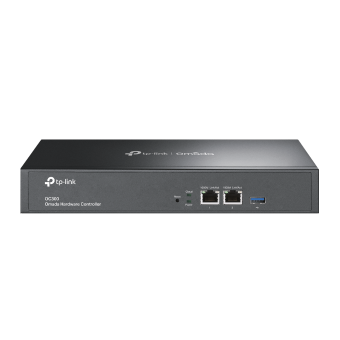What to do if you get an alert of “The number of logs is up to the limit”
OC200 , OC300 , Omada Software Controller( V5 ) , Omada Cloud-Based Controller
Recent updates may have expanded access to feature(s) discussed in this FAQ. Visit your product's support page, select the correct hardware version for your device and check either the Datasheet or the firmware section for the latest improvements added to your product.
This article applies to Omada SDN Controller v5.0 and above.
You may receive an alert of “The number of logs is up to the limit”. This article will explain why you get the alert and how to handle it.
1. the maximum number of logs.
The maximum number of logs for OC200 and OC300 is 11000 and 101000, respectively.
For Omada Software Controller, the maximum number of logs depends on the number of managed Omada devices.
If the number of managed Omada devices (let's say x) does not exceed 100, the maximum number of logs is 150 * 31 * x. If the number exceeds 100, the maximum number of logs is 150 * 31 * 100 + 30 * 31 * (x-100).
When the number of logs in your controller exceeds the upper limit, you will receive an alert of “The number of logs is up to the limit”.
2. What to do?
Omada SDN Controller will automatically delete the oldest 10% of logs. Therefore, you may not worry about that.
But if you get such alerts frequently, there are probably a lot of client roaming events, which generate many logs. You can go to Log – Notifications, to adjust the notification settings. For example, you can uncheck “Log full” notification in System, or “Client Roaming (Wireless)” notification in Client, or other frequent log types.

Looking for More
Is this faq useful?
Your feedback helps improve this site.
What’s your concern with this article?
- Dissatisfied with product
- Too Complicated
- Confusing Title
- Does not apply to me
- Too Vague
- Other
We'd love to get your feedback, please let us know how we can improve this content.
Thank you
We appreciate your feedback.
Click here to contact TP-Link technical support.
TP-Link Community
Still need help? Search for answers, ask questions, and get help from TP-Link experts and other users around the world.
This website uses cookies to improve website navigation, analyze online activities and have the best possible user experience on our website. You can object to the use of cookies at any time. You can find more information in our privacy policy . Don’t show again
This website uses cookies to improve website navigation, analyze online activities and have the best possible user experience on our website. You can object to the use of cookies at any time. You can find more information in our privacy policy . Don’t show again
Basic Cookies
These cookies are necessary for the website to function and cannot be deactivated in your systems.
TP-Link
SESSION, JSESSIONID, accepted_local_switcher, tp_privacy_base, tp_privacy_marketing, tp_smb-select-product_scence, tp_smb-select-product_scenceSimple, tp_smb-select-product_userChoice, tp_smb-select-product_userChoiceSimple, tp_smb-select-product_userInfo, tp_smb-select-product_userInfoSimple, tp_top-banner, tp_popup-bottom, tp_popup-center, tp_popup-right-middle, tp_popup-right-bottom, tp_productCategoryType
Youtube
id, VISITOR_INFO1_LIVE, LOGIN_INFO, SIDCC, SAPISID, APISID, SSID, SID, YSC, __Secure-1PSID, __Secure-1PAPISID, __Secure-1PSIDCC, __Secure-3PSID, __Secure-3PAPISID, __Secure-3PSIDCC, 1P_JAR, AEC, NID, OTZ
Zendesk
OptanonConsent, __cf_bm, __cfruid, _cfuvid, _help_center_session, _pendo___sg__.<container-id>, _pendo_meta.<container-id>, _pendo_visitorId.<container-id>, _zendesk_authenticated, _zendesk_cookie, _zendesk_session, _zendesk_shared_session, ajs_anonymous_id, cf_clearance
Analysis and Marketing Cookies
Analysis cookies enable us to analyze your activities on our website in order to improve and adapt the functionality of our website.
The marketing cookies can be set through our website by our advertising partners in order to create a profile of your interests and to show you relevant advertisements on other websites.
Google Analytics & Google Tag Manager
_gid, _ga_<container-id>, _ga, _gat_gtag_<container-id>
Google Ads & DoubleClick
test_cookie, _gcl_au










1.0_normal_1592202397383a.png)